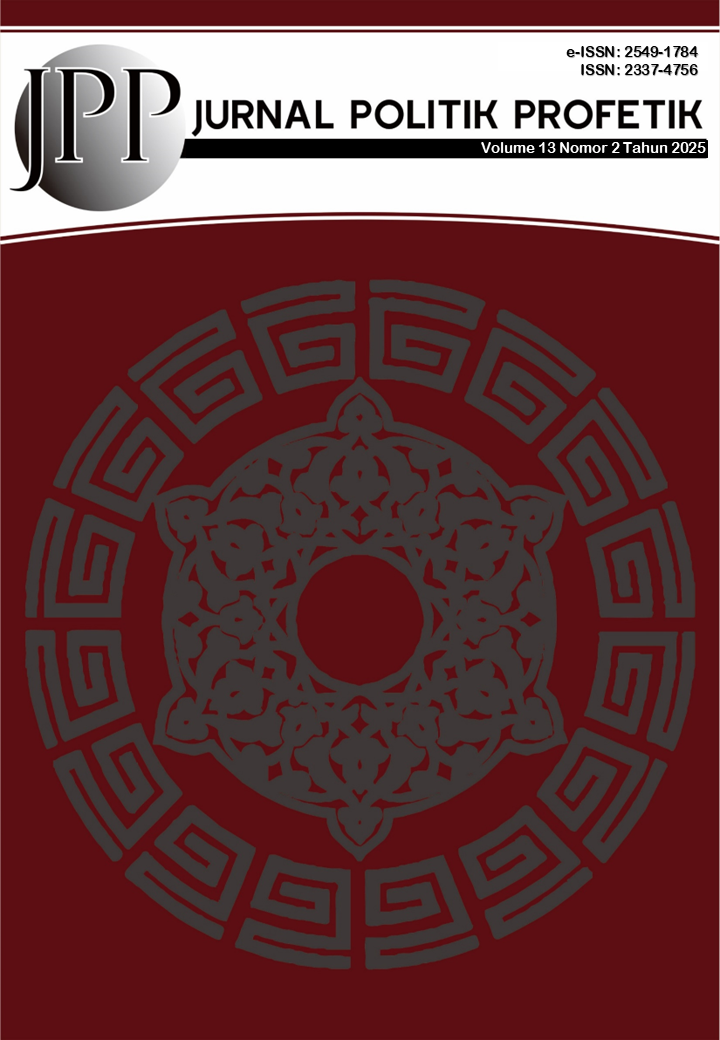Analisis Functional Theory dan Personal Qualities dalam Debat Pilkada Kalimantan Selatan 2024
DOI:
https://doi.org/10.24252/profetik.v13i2a2Keywords:
Election, Political Discourse, Function , Personal Qualities, CrosstabsAbstract
This study aims to analyze political communication strategies in the 2024 South Kalimantan regional election debate using Benoit’s Functional Theory and Personal Qualities approach. The study employs content analysis with a quantitative approach, examining candidates’ verbal statements in the debate accessed via YouTube. The total units of analysis are 800. The findings show significant differences between the two candidates, as evidenced by the chi-square test results (p < 0.001) in the use of functions (acclaim, attack, defense) and personal qualities (leadership ability and values/principles). Candidate 1 is dominant in using defense and highlighting leadership ability, while Candidate 2 is dominant in using acclaim and attack, emphasizing values/principles. This study complements previous research and contributes new insights to the development of political debate theory, particularly Functional Theory and Personal Qualities.
Downloads
References
Ajilore, O. O. (2014). Acclaims, attacks and defences in Nigerian gubernatorial de-bate. Discourse & Communication, 9(1), 3–18. https://doi.org/10.1177/1750481314555261
Amin, N. F., Garancang, S., & Abunawas, K. (2023). Konsep umum populasi dan sampel dalam penelitian. JURNAL PILAR: Jurnal Kajian Islam Kontemporer, 14(1), 15-31.
Benoit, W. L., & Harthcock, A. (1999). Functions of the great debates: Acclaims, attacks, and defenses in the 1960 presidential debates. Communication Mono-graphs, 66(4), 341–357. https://doi.org/10.1080/03637759909376484
Bhattarai, K., Bachman, P., Conte, F., Haughton, J., Head, M., & Tuerck, D. G. (2017). Tax plan debates in the US presidential election: A dynamic CGE analy-sis of growth and redistribution trade-offs. Economic Modelling, 68, 529–542. https://doi.org/10.1016/j.econmod.2017.08.031
Fernandes, J. M., Debus, M., & Bäck, H. (2021). Unpacking the politics of legislative debates. European Journal of Political Research, 60(4), 1032–1045. https://doi.org/10.1111/1475-6765.12454
Hart, R. P., & Jarvis, S. E. (1997). Political debate. American Behavioral Scientist, 40(8), 1095–1122. https://doi.org/10.1177/0002764297040008010
Hidayah, A. U., & Kweldju, S. (2022). A functional approach to the 2019 Indonesian presidential debate. JoLLA Journal of Language Literature and Arts, 2(9), 1305–1317. https://doi.org/10.17977/um064v2i92022p1305-1317
Keum, H., & Cho, J. (2021). Presidential debates and voter decision making. The Social Science Journal, 1–12. https://doi.org/10.1080/03623319.2021.1925053
Khotimah, K., & Kusuma, E. R. (2024). Kontestasi Wacana Politik dalam Debat Capres RI 2024 Kajian Pragma-Dialektikal. Jurnal Pendidikan Bahasa Dan Sastra Indonesia Metalingua, 9(1), 67-74. https://doi.org/10.21107/metalingua.v9i1.25094
Lauri, M., Carbin, M., & Linander, I. (2023). The rise of carceral feminism in Swe-den: Analysing political debate and policy on men’s violence against women. Women S Studies International Forum, 99, 102780. https://doi.org/10.1016/j.wsif.2023.102780
Mulgan, R. G. (1968). Defining ‘Democracy.’ Political Science, 20(2), 3–9. https://doi.org/10.1177/003231876802000201
Parcher, J. (1998). The value of debate. Report of the Philodemic Debate Society, Georgetown University.
Riffe, D., Lacy, S., Fico, F., & Watson, B. (2019). Analyzing media messages using quantitative content analysis in research (4th ed.). Routledge.
Sonnsjö, H. (2024). What we talk about when we talk about electricity: A thematic analysis of recent political debates on Swedish electricity supply. Energy Policy, 187, 114053. https://doi.org/10.1016/j.enpol.2024.114053
Sugiyono. (2020). Metode penelitian kuantitatif, kualitatif, dan R&D. Alfabeta.
Wiwid. (2024). Strategi Kampanye Partai Amanat Nasional pada Pemilu Legislatif 2024: Pendekatan Teori Marketing-Mix. Jurnal Politik Profetik, 12(1), 37–63. https://doi.org/10.24252/profetik.v12i1a3
Downloads
Published
How to Cite
Issue
Section
License
Copyright (c) 2025 Ni Ketut Rahma Pratiwi Shanti, Ikhsan Fuady, Kunto Adi Wibowo

This work is licensed under a Creative Commons Attribution-NonCommercial-ShareAlike 4.0 International License.




















